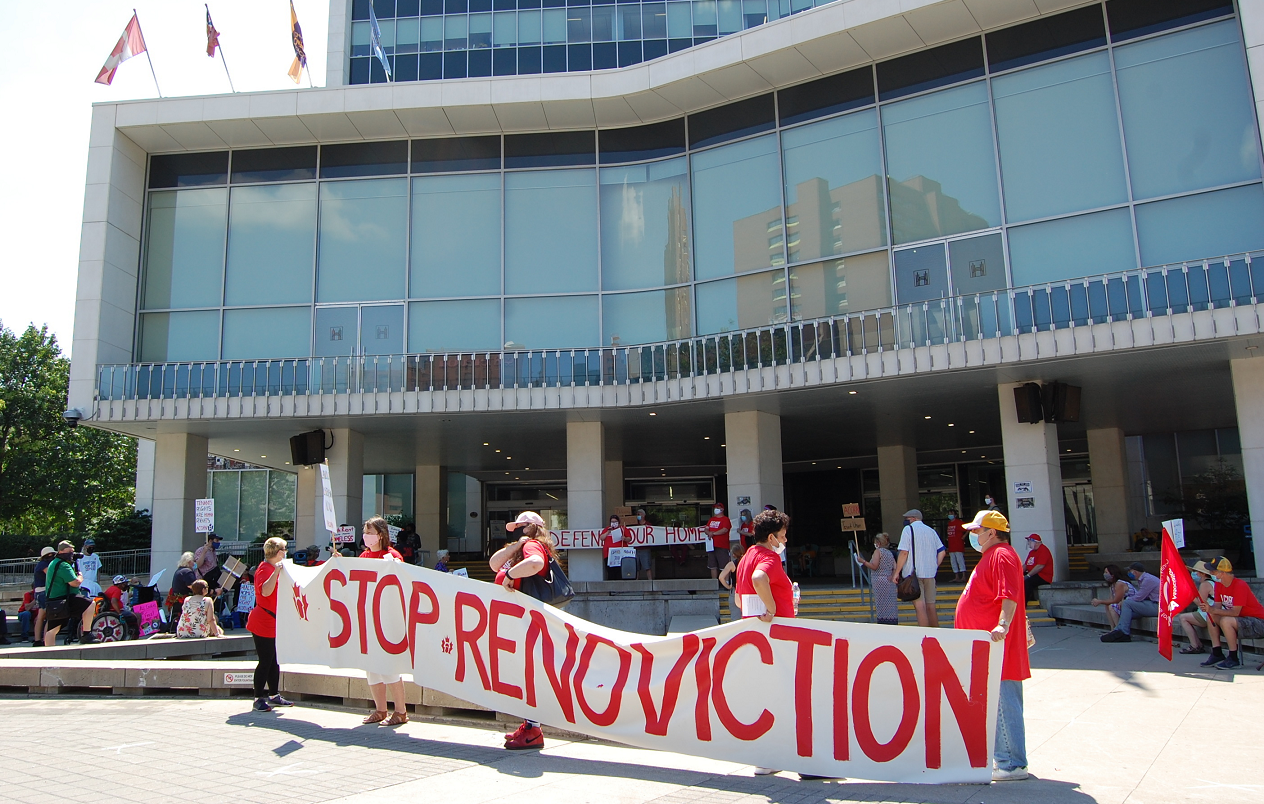Global News: Tenant advocacy group calls on Hamilton council to implement bylaw to stop ‘renovictions’
Posted August 24, 2020
A group fighting for the interests of local tenants says Hamilton city council needs to implement a landlord licensing bylaw that would aim to stop “renovictions”.
Posted August 24, 2020
 A group fighting for the interests of local tenants says Hamilton city council needs to implement a landlord licensing bylaw that would aim to stop “renovictions”.
A group fighting for the interests of local tenants says Hamilton city council needs to implement a landlord licensing bylaw that would aim to stop “renovictions”.
Hamilton ACORN rallied in front of city hall on Friday afternoon, urging councillors to take “bold action” on the affordable housing crisis, citing a 24-per cent average rent increase in the city between 2018 and 2019.
That number is mentioned in the group’s latest report, “Defending Our Homes”, which also finds that one in five Hamilton renters spent more than half of their paycheque on rent.
The landlord licensing bylaw that the group wants Hamilton councillors to consider is already in effect in some municipalities in British Columbia, including the city of New Westminster in Metro Vancouver.
It tackles the practice of “renovictions” — when a landlord evicts a tenant under the guise of doing renovations and then raising rent on the unit — by introducing strict fines for landlords who evict tenants without notice, or who fail to provide them right of first refusal after renovations are done.
“The time is now – we can’t wait any longer,” said Mike Wood, chair of the downtown chapter of Hamilton ACORN. “We need the existing affordable housing to be protected.”
The group is also calling for more investment in support for tenants, including outreach initiatives to educate tenants who may not be aware of their rights.
Michael Blashko, a housing lawyer with the Hamilton Community Legal Clinic and a new transplant to Hamilton, said he’s already met and worked with several residents who struggle with threats of eviction or getting basic repairs fixed within their units.
“We hear the stress, the anxiety, the frustration that tenants in Hamilton are feeling when these issues arise and make them feel less secure in their current housing situations,” said Blashko.
While the desired bylaw wasn’t on the table at Friday’s city council meeting, councillors did approve a motion that urges the provincial government to reinstate a temporary freeze on evictions while people are out of work due to the pandemic.
The Ontario-wide eviction ban was imposed in March but expired in late July when the Ford government lifted the state of emergency.
Ward 14 councillor Terry Whitehead, who introduced the motion, said many Ontarians and Hamiltonians still don’t have a steady source of income, even as some businesses and services are reopening during Stage 3.
“I have talked to and met many people that are still unemployed,” said Whitehead. “They are dangerously close to not having a home to stay in.”
Ward 3 councillor Nrinder Nann, who helped second and add amendments to the motion, said it’s “unfortunate” that there are landlords across multiple wards of the city that are engaging in renoviction practices in the middle of the pandemic.
The motion also calls on the province to release data from the Landlord and Tenant Board to let city staff know exactly how many Hamiltonians are facing eviction.
Without that information, Nann said the city can’t prepare to provide the necessary services for an influx of people who need access to housing or shelter.
“There’s no way that we can prepare for the looming evictions. Whether it’s 323 evictions that are under applications, whether it’s 500 applications for evictions under the Landlord Tenant Board, we don’t have those statistics,” Nann said.
“And that prevents us as a municipality from preparing in the way that we ought to and need to for those who are facing homelessness in the coming months.”
Homelessness has become much more visible in the city due to encampments cropping up more frequently since the beginning of the pandemic, with collections of tents growing outside FirstOntario Centre — where a temporary emergency men’s shelter was set up — and along Ferguson Avenue North near the Wesley Day Centre.
An injunction from the Superior Court is preventing the city from removing anyone in those encampments until September.
Councillors went into a private in-camera session of council on Friday afternoon to discuss the litigation.
***
Article by Lisa Polewski for Global News
